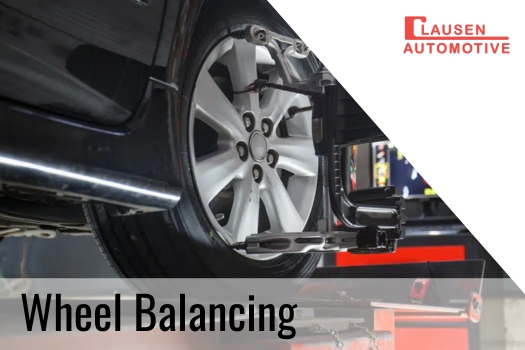What happens if wheels are not balanced?
If you’re wondering what happens if wheels are not balanced, expect steering-wheel vibration, uneven tire wear, and extra stress on suspension components.
What you’ll notice right away:
- Vibration and shimmy: shaking in the steering wheel at 45–70 mph that often worsens with speed.
- Uneven tire wear: cupping or scalloping that shortens tire life and increases noise.
- Poor tracking: the car wanders or pulls, and you make constant small corrections.
- Stress on parts: added load on shocks, struts, bearings, and tie rods accelerates wear.
- Bottom line: what happens if wheels are not balanced is more vibration, faster wear, and reduced control.
How service correct the problem:
- Wheel balance: adding weights cancels heavy spots so each wheel rotates smoothly.
- Alignment check: a front alignment sets toe, camber, and caster to spec for straight-line stability and even tire wear.
- Steering centered: the wheel points straight, reducing wandering and driver fatigue.
- Safer braking: proper alignment keeps the contact patch flat for predictable stops.
Road-trip prep checklist:
- Tire pressures and rotation: set to door-jamb spec and rotate if due.
- Balance confirmation: rebalance if vibration returns after potholes or curb hits.
- Alignment appointment: book a front alignment if the wheel is off-center, tires wear unevenly, or the car drifts.
The takeaway: If you’re asking what happens if wheels are not balanced, schedule front alignment and wheel balancing to restore smooth tracking and safety before a long road trip.
Wondering what happens if wheels are not balanced? Contact our ASE Certified Technicians at Clausen Automotive, The Hybrid Shop, for more information about front alignment and to schedule an appointment. Since 1975, our family-owned auto shop has proudly served vehicle owners in Madison, WI, and the surrounding communities.

If you’re wondering what happens if wheels are not balanced, expect steering-wheel vibration, uneven tire wear, and extra stress on suspension components.
What you’ll notice right away:
- Vibration and shimmy: shaking in the steering wheel at 45–70 mph that often worsens with speed.
- Uneven tire wear: cupping or scalloping that shortens tire life and increases noise.
- Poor tracking: the car wanders or pulls, and you make constant small corrections.
- Stress on parts: added load on shocks, struts, bearings, and tie rods accelerates wear.
- Bottom line: what happens if wheels are not balanced is more vibration, faster wear, and reduced control.
How service correct the problem:
- Wheel balance: adding weights cancels heavy spots so each wheel rotates smoothly.
- Alignment check: a front alignment sets toe, camber, and caster to spec for straight-line stability and even tire wear.
- Steering centered: the wheel points straight, reducing wandering and driver fatigue.
- Safer braking: proper alignment keeps the contact patch flat for predictable stops.
Road-trip prep checklist:
- Tire pressures and rotation: set to door-jamb spec and rotate if due.
- Balance confirmation: rebalance if vibration returns after potholes or curb hits.
- Alignment appointment: book a front alignment if the wheel is off-center, tires wear unevenly, or the car drifts.
The takeaway: If you’re asking what happens if wheels are not balanced, schedule front alignment and wheel balancing to restore smooth tracking and safety before a long road trip.
Wondering what happens if wheels are not balanced? Contact our ASE Certified Technicians at Clausen Automotive, The Hybrid Shop, for more information about front alignment and to schedule an appointment. Since 1975, our family-owned auto shop has proudly served vehicle owners in Madison, WI, and the surrounding communities.


